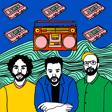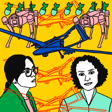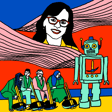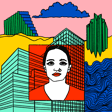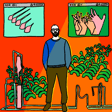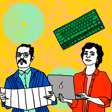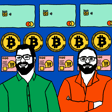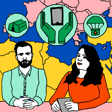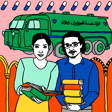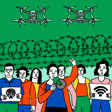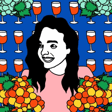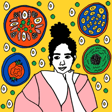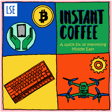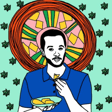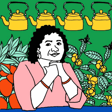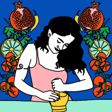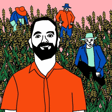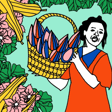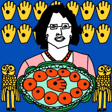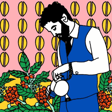Become a Creator today!Start creating today - Share your story with the world!
Start for free
00:00:00
00:00:01

1.10. Between Africa and the Arab World, Sudan's arts and culture with Omnia Shawkat
On this episode of Instant Coffee, Co-producer of Instant Coffee, Nadine Almanasfi, talks to Omnia Shawkat about arts and culture in Sudan, and the country's unique position between Africa and the Arab World. Omnia is co-founder of Andariya, a bilingual digital cultural platform from and on Sudan, South Sudan and Uganda. www.andariya.com
Transcript
Bridging Cultural Gaps with Africa
00:00:00
Speaker
complicated in so many different ways, but I think where we are right now is to accept where we are. We're an Arabic-speaking nation at this point. We don't have enough ties with Africa, and I think this is where Andrea really strives to create those ties and to build them on cultural exchanges. And at the same time, we do appreciate that we speak Arabic, we have some relations to the Arab world, and we'd like to maintain that for them to become healthier in relationships.
Introduction to 'Instant Coffee' Podcast
00:00:30
Speaker
This is Instant Coffee, a new podcast brought to you by the LSE Middle East Center and produced by me, Nadine Almanaspi and me, Ribalsleiman Hyder.
00:00:42
Speaker
Today's episode is extra special because it's hosted by our very own Nadine. I also just realized that we never introduced ourselves on the podcast, so here it goes. I am communications consultant and Nadine is events coordinator both at the LSE Middle East Center. On this episode, Nadine talks to Omnia Shaukat about arts and culture in Sudan and the country's unique position between Africa and the Arab world.
Meet Omnia Shaukat of Andaria
00:01:05
Speaker
Omnia is founder of Andaria, a bilingual digital cultural platform from and on Sudan, South Sudan and Uganda. Over to you, Nadine. Hi Omnia, how are you doing today? Hi, I'm great. How are you guys? Good, it's okay in London. It's a bit windy but it's good. Thank you so much for taking the time to be with us today and
00:01:29
Speaker
I'm really looking forward to sitting, virtually sitting with you and picking your brain on some things. So just to set the foundations for this chat, can you briefly tell us about the magazine that you've co-founded under your magazine? Why did you feel the need for it to be set up and what was the vision for it?
Purpose of Andaria: Countering Negative Narratives
00:01:51
Speaker
It was set up in 2015 and the idea was kind of birthing.
00:01:57
Speaker
while I met my co-founder for the first time in Khartoum. At the time, we were both not living in Khartoum, but we were both overlapping here for holidays. And we had met online on Twitter, and we had this four-hour conversation about how come no one is talking about all the positive things that are happening in the culture and art scene in Sudan. It's all negative, and everybody only knows about the negative things about Sudan. I mean, yes, it's there, but there's also things that
00:02:26
Speaker
young people are trying to do to better the country. So I think that's really the genesis of where this idea came from. And a little bit of discussion and a little bit of brainstorming led to it becoming a platform that is really an open space for people to talk about culture, arts, women, technology, and express
00:02:47
Speaker
not just the positive but with emphasis on the positive, but also the negative things and how we can fix them. So more of a constructive criticism.
00:02:56
Speaker
of what's going on and how we're living it, life as we're living it in Sudan. It of course then expanded really quickly in the same year that we launched. We wanted to also build a bridge between Sudan and South Sudan and that's when we started having content from South Sudan. A few maybe months after we realized that this is something that could really be for the entire continent. There is a lack of positive news in the continent and we want to document, if we want to be part of
00:03:26
Speaker
that story writing, the narrative changing and to uplift people's stories about what they know and what they don't know about Sudan, South Sudan and also Uganda now.
Omnia's Journey from Biology to Storytelling
00:03:37
Speaker
I think you were like a biologist before this, right? Or that was what your focus was. I mean, have you always kind of been interested in this digital storytelling that
00:03:51
Speaker
that you do now with N. Daria Mag? Or is this something that really just started in 2015? I was always interested in stories. I read a lot. I love visuals. I love short videos that tell stories or a quick overview of things. I am a biologist. I have a Master's in Environmental Resource Management and Water and Climate Policy. I did work in that field for about six years before switching to media tech and culture.
00:04:18
Speaker
I think it was a bit of an exciting jump. I was in California at the time when the idea for Andrea came up and the planning started and it was extremely exciting to be in an environment where everything is technology driven and everything is digital, everything is about the future of tech and all of that.
00:04:39
Speaker
And I think part of me definitely wanted to be part of that exciting, really new world where tech really facilitates our lives and connects us. And I think this is really at the core of what Andrea wants to do. It's to really connect people through stories. I believe this story came from
00:04:56
Speaker
A little bit of environmental activism that I had early on in my career, advocacy, campaigning, with different organizations. I set up an environmental storytelling platform, a very small thing. We were about like four years. We had a few people contribute, but it was nothing of the scale or size of Enderia, and it was definitely not a sustainable enterprise. It was just more of a blog. The thing I had, the foundation for what Enderia is right now somewhere,
00:05:25
Speaker
tied to my biology background, but it wasn't in the same way. And so you said that the magazine focuses on stories from Sudan, South Sudan and Uganda. Now, I guess for some people listening, the relationship between those countries and the Middle East as it's conventionally known might not feel very clear, but
00:05:45
Speaker
I guess in a way what we are also trying to do with this podcast is to complicate that understanding of the Middle East. So recently we had an artist of Afghan heritage speaking about locating Afghanistan within the Middle East.
Sudan's Dual Identity: Africa and the Arab World
00:05:57
Speaker
So I guess focusing on Sudan for now, how does Andrea magazine and I guess by extension yourself understand this relationship between the Middle East and Sudan, which is quite a unique one?
00:06:10
Speaker
So interesting, way back when I used to live in Egypt, I lived in Egypt for about 10 years, but I grew up in the Arab region, I grew up in Libya, I grew up in Qatar, Emirates, but mostly in Egypt. And I remember knowing when I was there that Sudan is part of the Arab world and there's I think 22 countries part of the Arab world and there's the Arab League and all of that, must have been like a class or something. And my understanding of this at the time was, okay, Sudan is neighboring Egypt, it's in Africa, sure we speak Arabic,
00:06:40
Speaker
We're part of the Arab world, but as I grew up and especially as I travel to Europe and then to the US, the understanding of what all of these things mean has become so complicated. As you said, we're bringing the complicatedness and the complexity of these notions into this conversation. And it's not an easy thing to think about because, for one, my dad is Nubian. He spoke Nubian till he was nine and then no longer.
00:07:06
Speaker
It's been Arabic ever since. And there's an entire generation of Sudanese people who have indigenous languages that were wiped out. And this was systematically done through politics. So 30 years of political rule that put the Arab Islamic
00:07:23
Speaker
agenda on the map for Sudan and really enforces it in a lot of indigenous populations is what happened. And when I got to know about that, of course, I felt a certain way about it. And then another dimension of that is when we're setting up end-to-end, so under this cross-cultural projects and we operate on a hybrid social enterprise model. So we do accept grants to work on such creative projects and
00:07:48
Speaker
trying to find where Sudan fits within these grants, distributions, let's say sub-Saharan Africa, and then there's North Africa, there's Horn of Africa, and then there's East Africa, and then there's Sudan. So sometimes it's North Africa, sometimes it's East Africa, it's actually never East Africa, it's sometimes Horn of Africa, sometimes sub-Saharan Africa.
00:08:07
Speaker
And that just makes me laugh because it's OK. I think it's OK that we don't fully subscribe to the Arab world. It's OK that we sometimes get clustered with it. And it is what it is that now most people in Sudan speak Arabic after 30 years of Arabization. So it's complicated in so many different ways. But I think where we are right now is to accept where we are. We're an Arabic-speaking nation at this point. We don't have enough.
00:08:37
Speaker
ties with Africa and I think this is where Andrea really strives to create those ties and to build them on cultural exchanges and at the same time we do appreciate that we speak Arabic, we have some relations to the Arab world and we'd like to maintain that for them to become healthier relationships where this Arabization is not really enforced, it's embraced and where its advances are
00:09:00
Speaker
you know, our well-being than so we get. And the whole world is really opening up. We should really be opening up our horizons to other regions, Africa, their world. That's great. Let's also open up to other regions. I see a lot of people are taking up Chinese, for example. So I think the whole world is really changing. So in its essence, it's very complicated and it's not uniform in any way.
00:09:21
Speaker
But also it's something that we are slowly trying to unpack and understand for ourselves as individuals, as tribes and community, as a nation, and then as part of a region, or regions actually in this instance. Yeah, I know that that makes sense. And I guess in a way, right, you're in your move more towards Africa, it's kind of trying to find the unique position that Sudan has.
00:09:51
Speaker
So also I guess we should speak about the the Sudanese revolution which was an incredibly inspiring historic moment over the past few years. How did you and your colleagues at Andrea understand your role as storytellers or journalists during the Sudanese revolution?
Role in the Sudanese Revolution
00:10:10
Speaker
Did you see yourself more as
00:10:12
Speaker
separated reporters, or was it hard to distinguish between the two things, being a citizen and being a journalist during that moment? It was not so hard because we knew where we stood as individuals. It was very clear that we were clearly not pro-government at any point in our establishment. We were never pro-government, but we tried to stay very far from politics. But the thing is, everything is political. So at times we were
00:10:40
Speaker
very much into politics and at times we would tackle politics from a different angle. So sometimes it's about women, sometimes it's about policies, technology, sometimes it's about culture. But we did not want to establish the kind of brand that people easily box without looking at the objectivity of the subject itself.
00:10:58
Speaker
and the narration and the storytelling component of it. So as individuals, it was very easy for us to decide which side we were on. As an organization, it was really concrete. It was a moment where we just could not really deny that this is the time to be not neutral, to not be neutral, to be very provocative and also proactive in the way that we tell our stories. So we
00:11:24
Speaker
Of course we went to a protest. I was in and out of the country a lot, but I know that my team was definitely on the ground a lot. We were astonished with the arts movement and how it really pushed through not just the revolution, but its different messages across online and offline platforms.
00:11:41
Speaker
It was beautiful to watch the world really tune in. And African nations were tuning in in a kind of scale that we've never really seen in our lifetime. And the Arab world was also kind of looking at us like, okay, this is interesting, especially after what they call the Arab Spring.
00:11:57
Speaker
I think we had people's attention. And when it comes to media, you really have to send out a message that is kind of immortal. So we created some people the revolution in numbers, which is a data driven project where we're collecting data sets. So I think we have about 28 data sets is completely open source. And we created stories that were based on data journalism. And that was really our contribution in a way. And then on the other side, we had
00:12:25
Speaker
filmed videos with survivors of bullets and people who lost friends and documented a really important moment. The moment that the train of Akbar came into the Khartoum city and it was such an emotional, really beautiful moment to see. So I think in different ways, we were there. We were there with our cameras, we were there with our storytelling, we were relaying the information, but a huge part of it was we were
00:12:52
Speaker
taking care of ourselves as individuals that were extremely affected by everything that was going on. It wasn't just everything related to the revolution, but the ramifications and the circumstances surrounding that from economic hardships to blocked roads, internet shutdowns, killings on the street, persecution. It was a lot. So as a platform, as a community,
00:13:17
Speaker
We took a step back and said, we'll do what's good for ourselves and we'll document things as much as we can. But we're there. We're present and we're going to continue to be an active part. And until this year, we have a really interesting project this year and next year on the arts and the revolution and how 30 years of oppression affected the arts and culture
Impact of Politics on Sudanese Arts and Culture
00:13:37
Speaker
movement. And it's going to result in our first book in everything in English.
00:13:42
Speaker
So can you talk a bit more about what you just said about the arts and culture and the impacts that the revolution had on that and how it's been in Sudan for the past 30 years? So what's the premise of that book? Yeah, it's a really interesting book. So during COVID, we were supposed to be going into the field, I think, from April. And because of COVID, we had to just resign ourselves to doing desk work. It's a team of four researchers. And
00:14:12
Speaker
what they were finding just through the desk research and calls and networking and having several conversations with artists, cultural managers, cultural curators, theater performers, is that the memory of art has been not wiped out but very close to that. And the relationship of the community with art, with artists, how they view them, how they perceive art, how they classify good versus
00:14:40
Speaker
bad art or highbrow versus common, that has been completely changed by the 30 years of rule of not just a dictatorial government, but also an Islamic government, a very strict government that in a way not just oppress the arts, but oppress the people in the way that they perceive arts as good or bad.
00:15:03
Speaker
Um, and it's, it's a, it's a work in progress. There's not really a conclusion that I can give you, but the results are incredibly painful. Um, to go, we were just in Al Jazeera and Madani and we saw how cultural spaces have been demolished and in their place.
00:15:22
Speaker
It's just ruins, basically. And these were once vibrant spaces where people spent time to get to know different topics and themes and debate them and open up their horizons. And these are no longer. We've also seen the savage state of bookstores. But despite how
00:15:41
Speaker
that have been defunded and harassed and their books were banned, they continue to really persevere and to try to exist within this really, really small space. Now that you have the revolution, which was an explosion of art, which is the case in almost all revolutions, and that was for us a breath of fresh air. By now, a year on, we're seeing just a few days ago, actually a week ago, exactly a week ago, five feed arts groups
00:16:10
Speaker
artists were arrested and detained and now they're in prison. So the spaces aren't opening up the way we had hoped for it. It did during the time of the revolution, but right now we're seeing really incredible amounts of shrinkage taking place and it's alarming, but at the same time almost drastically predictable.
Art as a Political Tool in Sudan
00:16:29
Speaker
And at the same time, you know, I was just saying that the infrastructure has been demolished and artists have been burned or destroyed. And it's really hard to think, what are we going to throw back on? Unless we have, you know, it is really back off from the second that it's right and rebuild itself and pretty much look at tools, then we're just going to have like some jump starts and then complete destruction and then jumpstart and that's what happened during the time of the previous regime.
00:16:59
Speaker
I think the results will be painful. And I'm assuming that the art and the cultural spaces that are being shut down are those that are political in nature or is it not the case? Are certain types of art being allowed to persist, maybe depoliticised or artwork that doesn't shake the table in any way? You're right, absolutely. The art that doesn't shake the table or that claps for the
00:17:26
Speaker
for the people sitting at the table, is allowed to thrive in a way. But if you're kind of criminalizing art, and art's role is to challenge, it's to inspire, it's to question. So art is definitely political. Maybe it's distance, I'm not sure, but I think art has always been political for some of these people. Not just traditional art, whether it's music, whether it's the right to exist as a certain tribe, and just in a certain way,
00:17:55
Speaker
have certain traditions, so it is always been political and it has always been fought. Sometimes in a way that is harsh and criminalizing and allows people in jail and sometimes through criticism that shakes social norms and gets people to be accepting of certain forms of art, which is really limiting for artists because that's really the court of artists to be able to be creative beyond any limits. So the idea is to
00:18:22
Speaker
Basically, be alarmed as artists are people working in this field because not only is the space shrinking, but the artists themselves are not being provided the freedom that they had striked for in the revolution.
00:18:37
Speaker
So unfortunately, we're running out of time.
Andaria's Expansion Plans
00:18:39
Speaker
But I guess I'd like to ask you, what's the plan for Andaria? What do you see Andaria looking like in five years' time? I see us growing into the East Africa region. I think that's really our priority region right now. We've already entered Uganda. We have full-time workers there, staff, community. We've built a community of contributors as well. Slowly we're building an audience. We had one project.
00:19:07
Speaker
training there and we'd like it more. And then we'd like to slowly spread into the region. We just published our call yesterday for content creators from Burundi, Djibouti, Somalia, Somaniman. So slowly we're trying to bring together content creators and stories from these countries so that there really could be a regional platform. And then essentially, maybe after the five years mark, we'd be piloting in a different region, so maybe West Africa or South Africa. But hopefully,
00:19:38
Speaker
maybe 15 years, we'll be all over the continent, or maybe even shorter than that. Yeah, that's the plan. Continue telling stories, continue supporting the art sector and industry. And continuing to be away from the Middle East. Sounds great. Well, we've got the perfect language there, so. Thank you so much, and all the best with Andrea, and we're really looking forward to following your work in the future. Thank you so much for joining us. Thank you.
00:20:08
Speaker
Thank you for following me. Thank you for this great machine. Thank you, Omnia, for taking the time to speak to us. And thank you for listening to Instant Coffee, your quick fix of everything Middle East. To learn more about Andrea's work, follow the links in the podcast description. As always, don't forget to check us out on Twitter, Facebook and Instagram. Until next time.
